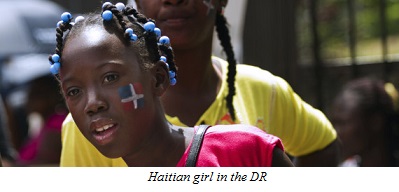 By Ardain Isma
By Ardain Isma
CSMS Magazine
When will the suffering end for the average, vulnerable Haitians, especially those who live in the Dominican Republic? Last month, I wrote a piece about unfair treatments of our brothers and sisters in the DR. I remember then saying both Haitians and Dominicans are victims of policies created, coordinated and executed by their respective leaders for different reasons. For Haitians, their misery has stemmed and grown out of ineffective governance and a complete disregard for human rights by petty bourgeois with no shame who have seized control of the state bureaucracy only to fill their lots. Haiti can crumble and rot, and it’s none of their business. It is rather the affairs of foreign diplomats who have been effectively in charge of the country, way before the earthquake of 2012.
For Dominicans, it is the arrogance of their upper class—made up mainly of people of fair skins consumed by deep-seated nonchalance—that has been leading the drive against Haitians. To them, a century of geostrategic Haitian dominance over Hispaniola is a nationalistic shame that can only be erased through sustained humiliation against Haitians. Of course, they can never erase history, but they can forever perpetuate or inflict irreparable damage against defenseless, inoffensive Haitian migrants in the DR.
To put it bluntly, Dominican nationalism was founded and fertilized by a cruel and blatant anti-Haitianism; and when things go sour for the country’s economy as it is now the case, to divert the attention, they redirect public opinion against those everyone loves to hate: the Haitians. This assertion has been symbolized by a disturbing picture of a bleeding and hopeless black man—presumably a Haitian—tied against a tree-trunk waiting for his execution. A Dominican soldier dressed in green olive uniform, raising his rifle in the air, seems ready to pull the trigger while dozens of spectators gleefully watch with their video cameras on hands. This ugly scene went viral on the internet—another sad chapter in this seemingly infinite Haitian plight.
I may be one of the pessimists, but I truly believe this latest violence against Haitians is not an act of unforeseen hatred. Nor is it only the direct results of historically misguided practices against people of Haitian descents in the DR. It is rather the latest attempt to institutionalize their policy of anti-Haitianism, to push their hatred to a new plateau. First, they fomented a law last September rubberstamped by the country’s Supreme Court, denying citizenship to people of foreign origin born after 1929, which is in essence forcing an estimated half a million of human beings to forever live in the fringe of society, according to the United Nations’ own accounts.
What does Michel Martelly do as Haitian president?
Of course, no one expected much from a Haitian government crippled by its own inefficiency while a large number of the Haitian elite have made the DR their home, especially the country’s second largest city, Santiago de los Caballeros. Despite the dilapidating condition of Haiti, those who have the money and who have a historical responsibility to contribute to the betterment of their “country” have opted for the easier option: using Haiti as their ambulant marketplace—some trashy place good solely to make money. When the weekend approaches, they pack their bags and head for the other side of the border, to their newly lavish homes filled with Haitian chambermaids.
Martelly went on to negotiate with Dominican president Danilo Medina mediated by Venezuela. But Medina wants to dictate the terms of the negotiations, trapping the Haitians into protracted talks that will never produce anything. Fearing total humiliation, Martelly tried to stall. On Wednesday, the Dominican Republic broke off talks with Haiti and recalled its ambassador for consultations. The reason? The decision came a day after Caribbean heads of state agreed to defer an application from the Dominican Republic for membership in CARICOM, the region’s largest cooperation group, until Santo Domingo addresses the high court’s ruling. “Haiti has decided to take a different route and that has brought an end to our talks for now,” said Gustavo Montalvo, chief of staff to Dominican Republic President Danilo Medina.
It was reported that Michel Martelly attended the CARICOM meeting in Trinidad and Tobago on Tuesday, where the region leaders urged Danilo Medina and his government to “right this terrible wrong.” Although the CARICOM’s urge was sincere, but it is fair to say that it was full of hypocrisy, for many of them do not treat Haitians any better, like in The Bahamas where Haitian migrants are completely disenfranchised.
Finally, there can only be one solution to the Haitian impasse: a rebuilding of Haiti’s infrastructure, which would demand the surgical removal of the state bureaucracy, the creation of a new form of government entirely committed to upholding the rights of the vast majority of the deprived masses who wallow in poverty every day.
Dr. Ardain Isma is editor-in-chief of CSMS Magazine. He teaches Cross-Cultural Studies at the University of North Florida (UNF). He is a scholar as well as a novelist. He may be reached at:publisher@csmsmagazine.org

